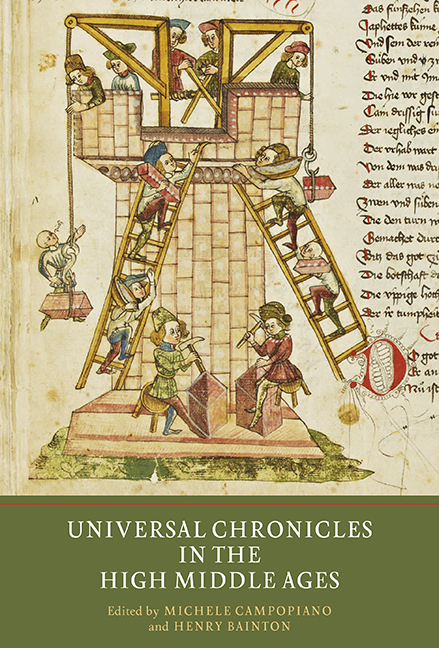Book contents
- Frontmatter
- Contents
- List of Illustrations
- Dedication
- Contributors
- Introduction: New Perspectives on Universal Chronicles in the High Middle Ages
- 1 The First Islamic Chronicle: The Chronicle Of Khalīfa B. Khayyāṭ (d. AD 854)
- 2 Universal Historiography as Process? Shaping Monastic Memories in the Eleventh-Century Chronicle Of Saint-Vaast
- 3 Writing Universal History in Eleventh-Century England: Cotton Tiberius B. i, German Imperial History-writing and Vernacular Lay Literacy
- 4 Political Didacticism in the Twelfth Century: the Middle-High German Kaiserchronik
- 5 Cosmology, Theology of History and Ideology in Godfrey of Viterbo's Pantheon
- 6 Écrire l'histoire universelle à la cour de Konrad IV de Hohenstaufen : la Weltchronik de Rudolf von Ems (milieu du XIIIe siècle)
- 7 Écrire la première histoire universelle en français: l'Histoire ancienne jusqu’à César de Wauchier de Denain et l'adaptation du modèle latin de l'histoire universelle à un public de laïcs
- 8 How Unusual was Matthew Paris? The Writing of Universal History in Angevin England
- 9 The Pillars of Hercules: The Estoria De Espanna (Escorial, Y.I.2) as Universal Chronicle
- 10 La vie d'Alexandre dans la Chronique dite de Baudouin d'Avesnes
- 11 Universal Histories and their Geographies: Navigating the Maps and Texts of Higden's Polychronicon
- Index
- Writing History in the Middle Ages
4 - Political Didacticism in the Twelfth Century: the Middle-High German Kaiserchronik
Published online by Cambridge University Press: 23 June 2018
- Frontmatter
- Contents
- List of Illustrations
- Dedication
- Contributors
- Introduction: New Perspectives on Universal Chronicles in the High Middle Ages
- 1 The First Islamic Chronicle: The Chronicle Of Khalīfa B. Khayyāṭ (d. AD 854)
- 2 Universal Historiography as Process? Shaping Monastic Memories in the Eleventh-Century Chronicle Of Saint-Vaast
- 3 Writing Universal History in Eleventh-Century England: Cotton Tiberius B. i, German Imperial History-writing and Vernacular Lay Literacy
- 4 Political Didacticism in the Twelfth Century: the Middle-High German Kaiserchronik
- 5 Cosmology, Theology of History and Ideology in Godfrey of Viterbo's Pantheon
- 6 Écrire l'histoire universelle à la cour de Konrad IV de Hohenstaufen : la Weltchronik de Rudolf von Ems (milieu du XIIIe siècle)
- 7 Écrire la première histoire universelle en français: l'Histoire ancienne jusqu’à César de Wauchier de Denain et l'adaptation du modèle latin de l'histoire universelle à un public de laïcs
- 8 How Unusual was Matthew Paris? The Writing of Universal History in Angevin England
- 9 The Pillars of Hercules: The Estoria De Espanna (Escorial, Y.I.2) as Universal Chronicle
- 10 La vie d'Alexandre dans la Chronique dite de Baudouin d'Avesnes
- 11 Universal Histories and their Geographies: Navigating the Maps and Texts of Higden's Polychronicon
- Index
- Writing History in the Middle Ages
Summary
The Middle High German Kaiserchronik, the chronicle of the emperors, is the first extensive verse chronicle in the Middle Ages in any European language, including Latin. Probably composed in Regensburg in Southern Germany around 1150, it soon became enormously popular: forty-nine manuscripts and fragments survive from the period between its composition and 1549.
The poem covers the period from the founding of Rome to the reign of Conrad III in 1146. It contains a history of kings and popes, in a somewhat erratic order, with episodes from the reigns of thirty-six ‘Roman’ and nineteen ‘German kings’ (some of whom are ahistorical), told alongside stories of various popes. Often, the stories are introduced with a formula: ‘The book tells us that X then held the Empire’ and most end with the length of the ruler's reign in years, months, and days, which are in most cases invented by the author. The stories differ considerably in length: the shortest are accounts of the king's reign articulated in just a few lines, the longest include long narratives (Claudius-Faustinian, for example, stretches to 2863 lines), entire legends (such as those about Sylvester and Veronica), short hagiographies, descriptions of pagan religion, exempla, long dialogues and debates (such as the dispute between St. Peter and Simon Magus in the Faustinian story).
The Kaiserchronik offers imperial history written in a vernacular language, composed at a time when the writing of universal histories in Latin was prolific. It draws extensively from a variety of sources, both Latin and vernacular. The chronicle attracted scholarly attention early on and keeps scholars busy to this day. The reason for this ongoing attention is that the chronicle, criticized by many for its lack of coherence, its many ‘errors’ and its sometimes inartistic narrative, is a unique work that has not yet been fully understood. A vast field of questions remains open, ranging from the author, to the place and circumstances of its composition, its use of sources, its genre, its target audience and its actual readership, the intention behind its composition and its literary context. The immense success of the work, despite what its modern readers sometimes consider its problematic composition, makes understanding the Kaiserchronik all the more important for what it reveals about literary consumption from the twelfth century onwards.
- Type
- Chapter
- Information
- Universal Chronicles in the High Middle Ages , pp. 95 - 120Publisher: Boydell & BrewerPrint publication year: 2017
- 1
- Cited by



